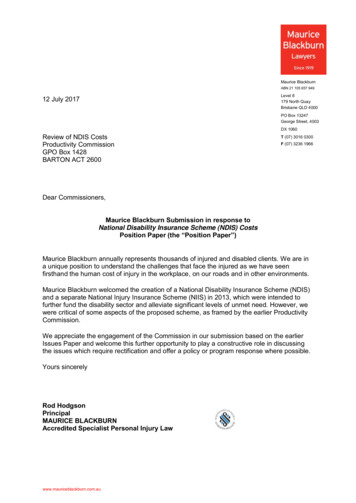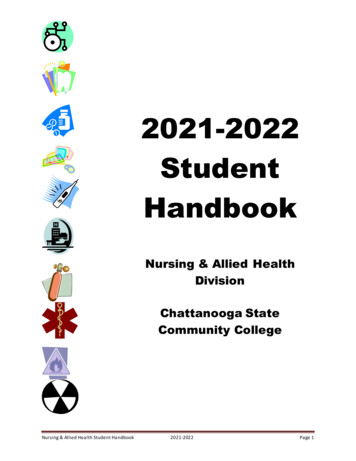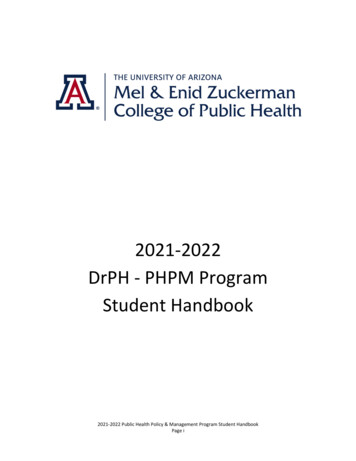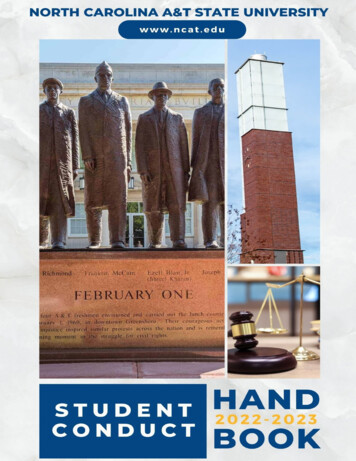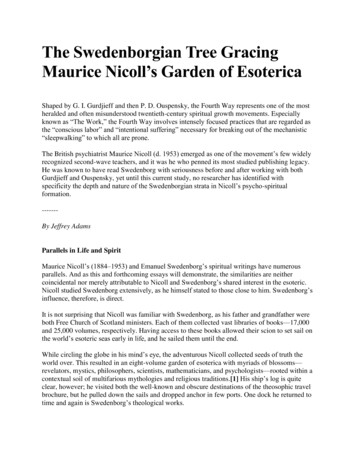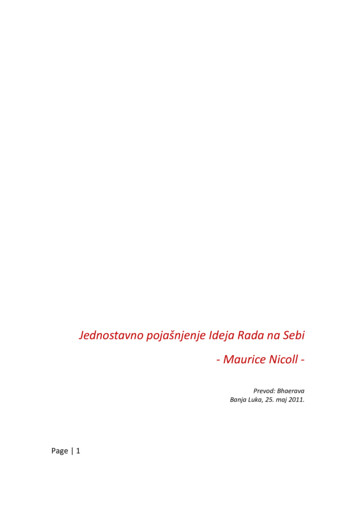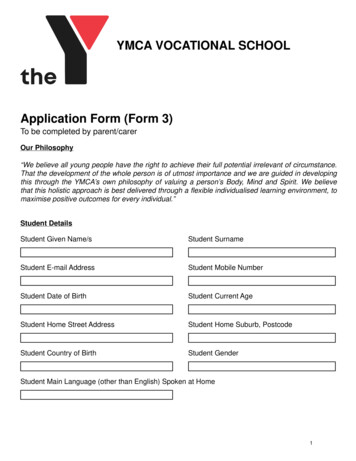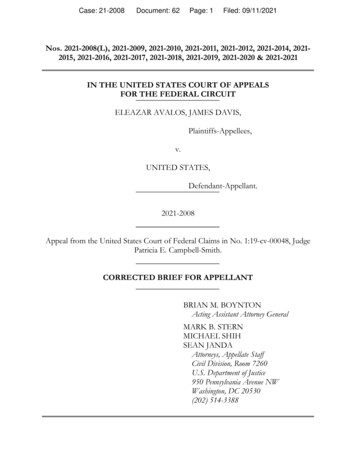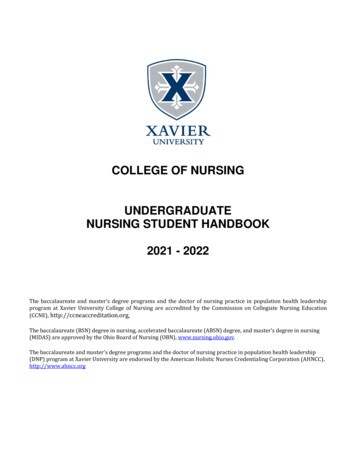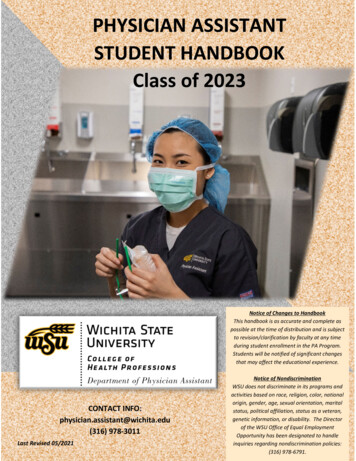
Transcription
MAURICE A. DEANE SCHOOL OF LAWAT HOFSTRA UNIVERSITYSTUDENT HANDBOOK2021-2022Founded in 1970, the Maurice A. Deane School of Law at Hofstra University is located on the southernpart of Hofstra University’s campus. Kushner and Koppelman Halls comprise the main facility, whichincludes the Law Library and the Siben & Siben Moot Court Room. Joan Axinn Hall, located just east ofthe Law School on California Avenue, houses the Enrollment Management Office and the Law School’sclinical programs. The lower level of Roosevelt Hall services the Law School’s five journals and providesadditional classrooms. The Law School website is located at law.hofstra.edu.CONTENTSINTRODUCTION: MESSAGE FROM THE DEAN OF STUDENTS3CHAPTER 1:LAW SCHOOL AND UNIVERSITY GENERAL INFORMATION4CHAPTER 2:ACADEMIC DEGREES AND GRADUATION REQUIREMENTSRequirements for the Juris Doctor DegreeSummary of Graduation Requirements for Juris Doctor Degree StudentsGraduation Requirements ExplainedTransferring Between the Full-Time and Part-Time DivisionsAccelerated GraduationRequirements for the Master of Laws (LL.M.) DegreeJ.D./M.B.A. ProgramJ.D./M.P.H. Program999101516171719CHAPTER 3:LAW SCHOOL REGULATIONSAcademic RegulationsExamination RegulationsCode of Academic ConductStudent Complaint Procedures2222273136CHAPTER 4:LAW SCHOOL POLICIES AND PROCEDURESAcademic g and Adding CoursesGrade ChangesGrade AppealsOutside EmploymentCredits for University Coursework Outside of the Law SchoolTransfer Credits for Coursework at Other Law SchoolsCredits for Coursework at Other Law SchoolsRecording PolicyWithdrawal from the School of Law38383839394041424242434343441
CHAPTER 5:SPECIAL SESSIONS AND PROGRAMSSummer SessionsStudy AbroadExchange Programs46464646CHAPTER 6:PROGRAMS BEYOND TRADITIONAL CLASSROOM COURSESClinical EducationIndependent StudyExternship ProgramsPro Bono OpportunitiesStudent Advocacy ProgramsRules for Election of Non-Classroom CoursesMaximum for Non-Classroom HoursDistance Education Policy474747474949495050CHAPTER 7:ACADEMIC HONORS, AWARDS AND PRIZESMerit Scholarship Program for Incoming StudentsFellowshipsDean’s Scholar ProgramsDean’s ListFirst-Year AwardsGraduation Honors52525252535354CHAPTER 8:JOURNALS AND STUDENT ORGANIZATIONS57CHAPTER 9:LAW SCHOOL OFFICESAcademic RecordsAcademic Success ProgramCareer ServicesExperiential LearningFinancial AidInformation Technology ServicesInternational ProgramsLaw LibraryStudent Affairs62626364676878808082CHAPTER 10:UNIVERSITY POLICIES AND PROCEDURESHealth and Safety—Preventing the Spread of Covid-19Nondiscrimination PolicyFamily Educational Rights and Privacy Act (FERPA)Nondisclosure of Directory InformationUniversity Disciplinary Proceedings848484848485APPENDIX:QUICK GUIDE OF IMPORTANT CONTACT INFORMATION2
MESSAGE FROM THE DEAN OF STUDENTSIt is my pleasure to welcome you to the Maurice A. Deane School of Law at Hofstra University. Youhave chosen to study law at a distinguished and exciting institution, where you join a community ofdedicated faculty, supportive administrators and outstanding peer groups in what will prove to be one ofthe most exciting times in your professional life.During your time here at Hofstra Law we will help you to develop and strengthen your skills and uncoveryour passions. Our academic programs will provide you with an education steeped in legal theory andpractical experience and will challenge and inspire you to make an impact in your profession. We hopethat you will set high standards for yourself and learn from one another.Outside the classroom, you will have opportunities to expand your learning by participating in a widevariety of extracurricular activities and programs, including student-run organizations and law journals,guest lectures and conferences, international programs and pro bono initiatives.The Office of Student Affairs is committed to supporting and guiding you as you embark on this excitingyet demanding professional endeavor. We are invested in your success and are here to support you in anyway possible. We look forward to your contribution to our community.This Student Handbook is designed to assist in that effort by providing you with basic information onissues that may arise during your time in law school. It contains academic regulations, policies andprocedures, departmental resources, and other important information. It is required reading for all lawstudents, and anyone taking classes at Hofstra Law is bound by these rules. If you have questions andcannot find the answer in this Handbook, please do not hesitate to call us at 516-463-5771, email us atLawStudentAffairs@hofstra.edu or stop by our offices.My warmest regards,Lisa MonticcioloOFFICE OF STUDENT AFFAIRS DIRECTORYLisa MonticcioloDean of Students, Diversity and Inclusion Officerlawlmm@hofstra.eduMichele LoFasoSenior Director of Student AffairsMichele.M.LoFaso@hofstra.eduHeather N. JohnsonAssistant Director of International Programs and Student Affairs CoordinatorHeather.N.Johnson@hofstra.eduAmy AngrisaniSenior Support SpecialistAmy.B.Angrisani@hofstra.edu3
CHAPTER 1: LAW SCHOOL AND UNIVERSITY GENERAL INFORMATIONA. Academic Calendar Please visit the “Current Students” page of the Law School website for alink to the most current version of the calendar. The calendar printed here is subject to change.Fall 2021DescriptionOrientation andIntro to Law ClassClasses BeginLabor Day – HolidayNo ClassesRosh Hashanah – HolidayNo ClassesYom Kippur – HolidayNo ClassesThanksgiving HolidayNo ClassesLast Day of ClassesThursday Class ScheduleReading DayFinal Exam PeriodLaw School CommencementDatesMonday, August 16 Friday, August 20Monday, August 23Monday, September 6Tuesday, September 7 Wednesday, September 8Thursday, September 16Thursday, November 25 –Friday, November 26Monday, December 6Tuesday, December 7Wednesday, December 8 –Tuesday, December 21TBASpring 2022DescriptionFirst Day of ClassesExtra Legal Writing ClassMartin Luther King, Jr. – HolidayNo ClassesMonday Class SchedulePresident’s Day – HolidayNo ClassesDatesWednesday, January 12Friday, January 14Spring Break – No ClassesMonday, March 14 Friday, March 18Monday Class ScheduleLast Day of ClassesReading DayReading DayFinal Exam PeriodLaw School CommencementMonday, January 17Wednesday, January 26Monday, February 21Thursday, April 28Friday, April 29Monday, May 2Tuesday, May 3 Monday, May 16TBA4
B. Bulletin Board and Television Screen Posting InformationBulletin boards are located in the basement hallways of the Law School. These bulletin boardsserve as a resource for students to find a variety of information, including study abroadopportunities, writing competitions, events and meetings for clubs and organizations, and housingavailability.Television screens are also located throughout the Law School highlighting events and importantLaw School and University announcements.Please consult the Office of Student Affairs before posting on the bulletin boards. Unauthorizedmaterials will be taken down immediately. Notices may not be posted on the building walls,doors, staircases, or glass-enclosed bulletin boards. Notices posted on restricted areas will beremoved. Student organizations looking to promote their events on the television screens mustmake their request with the Office of Student Affairs.C. Card ServicesThe HofstraCard is your key to ease, convenience, and opportunity at Hofstra University. Notonly does it serve as your official identification for Hofstra University, but the HofstraCard isused to gain access to the various facilities and technology at the University.Your HofstraCard gives you access 24 hours a day, seven days a week (except for certainholidays) to the Law School building, Law Library and first-floor computer lab through use of thecard swipes outside the entrances to these facilities.Students who choose to use the card as a debit card may also use it to access their meal plan aton-campus dining halls and pay for various services. Please see “Hofstra Card” under “StudentAffairs” on the Hofstra University website for more information.D. Calendar of Events and Common HoursThe Law School’s event calendar may be viewed at lawevents.hofstra.edu. Weekly commonhours (also known as “Dean’s Hours”) are Monday, Tuesday, Wednesday, and Thursday fromnoon to 2 p.m. and Wednesday from 6 to 8 p.m. No classes are regularly scheduled during thesehours.Common hours provide excellent opportunities to hold organizational meetings and specialprograms. Student organizations wishing to schedule events during common hours or at any othertime must reserve the date at least two weeks in advance by completing an event scheduling formeither in person in the Office of Student Affairs or online at law.hofstra.edu/studenteventsform.E. Counseling Services516-463-6745 or 516-463-6789 for emergenciesStudent Counseling Services provides psychological and educational counseling in individual andgroup settings. The collaborative counseling process is used to clarify problems, establish realisticgoals, and develop active, short-term treatment solutions. Emergency screening and counselingduring non-business hours can be initiated at any time by contacting Public Safety. All servicesare provided in a confidential, professional atmosphere. All enrolled Hofstra students are entitledto counseling at no charge for a limited number of sessions. For more information, see StudentCounseling Services.F. Dining ServicesUniversity dining locations, services and hours of operation can be found at Hofstra UniversityDining Services.
G. Housinga. On-CampusWhile many students choose to live off campus, on-campus housing is available. TheGraduate Residence Hall and Colonial Square house law students and other Hofstra graduatestudents. The living units are organized as suites with separate bedrooms surrounding acommon room and small kitchenette. For more information, see Hofstra Housing.b. Off-CampusThe University’s Off-Campus Living and Commuting Students Services Office maintains alisting of off-campus housing opportunities. It is available online atoffcampushousing.hofstra.edu.c. For Students with DisabilitiesStudents new to the area may benefit from the services of the Long Island Center forIndependent Living (LICIL), located in Levittown. LICIL is one of a network of independentliving centers located around the state and the country that provide information aboutcommunity resources, housing referrals, attendant care referrals, benefits advocacy, andtransportation assistance. LICIL can be reached at 516-796-0144 or licil.net.H. LockersDuring the semester, a sign-up book will be left in the locker room (Room 011) for reservinglocker space. Please follow the posted instructions in the room regarding the selection of a locker.Students are required to provide their own locks and store items in the lockers at their own risk.You may keep your locker for the academic calendar year. All locks will be cut, and contentsremoved the last Tuesday of July each calendar year. If you have problems with your lock orlocker, please contact Facilities in Room 244 of the Law School.I. FacilitiesThe Law School Facilities Office is located on the second floor of the Law School in Room 244.For all building maintenance issues — including temperature issues, coffee spills, elevatoroutages, bathroom concerns, etc. — please send an email to lawplant@hofstra.edu.J. Student LoungesThere are two student lounges on the second floor of the Law School. The first is located acrossfrom Room 230. Tables and chairs, as well as a microwave oven and small refrigerator, areprovided. The refrigerator is emptied out and cleaned every Friday at 4 p.m. The second lounge,with chairs and tables, is the Leeds Morelli & Brown Atrium, located above the Law Library.Throughout the school year, students may find information on various bar review courses, studentevents, and the Lexis, Westlaw and Bloomberg companies at tables that are set up in this lounge.The Gavel and Spoon Café is located on the main level of the Law School. Credit/debit cards ormeal plans are accepted.K. Lost and FoundThere are several places where students may check for lost items. At the Law School, studentsshould check with the Office of Student Affairs (Suite 203/204). Students may also check in theLaw Library, as its Circulation Desk accepts and temporarily holds found items when the Officeof Student Affairs is closed. The Library delivers such items to the Office of Student Affairs onthe next business day. In addition, students should contact the David S. Mack Public Safety andInformation Center at 516-463-6606 or the Service Desk on the main level of the Mack StudentCenter at 516-463-6925.6
L. Photocopy/Print Services Center516-463-5915The Print Services Center is located on the lower level of the Law School in Room 021. Thisfacility provides a variety of copying and printing services for Hofstra Law students, faculty, andstaff. Black-and-white copies cost 0.10 each, color copies, 0.75 each. The Print Services Centercopy charges are added by the Information Systems Department to students’ PridePrint account.There is one photocopy machine located in the Law Library that can be used with cash.M. Public Safety516-463-6606 or Dial 1 on Law School Classroom PhonesThe Department of Public Safety is in the David S. Mack Public Safety and Information Centeron the corner of Hempstead Turnpike and California Avenue. Public Safety Officers patrol thecampus and maintain safety for all members of the Hofstra community. Students must presentidentification to security personnel upon request. Public Safety provides 24-hour security to theHofstra campus. All incidents, suspicious behavior, or emergencies that occur on campus shouldbe reported to the Department of Public Safety. Public Safety works closely with the NassauCounty and Hempstead Police Departments and reports all incidents requiring police assistance tothe appropriate law enforcement agencies. Public Safety offers the following services to theHofstra community:a. Student EscortsStudent escorts are available daily between dusk and dawn to walk students to any on-campuslocation. Student escorts receive special training and are equipped with Hofstra Universityradios. For an escort, ask any Public Safety Officer or call 516-463-6606.b. TransportationThe Hofstra shuttle bus provides free transportation throughout the campus for members ofthe Hofstra community. Additional stops are made to popular off-campus locations, includingthe Long Island Railroad stations in Hempstead and Mineola, shopping centers andrestaurants within the service boundaries. All Hofstra buses are accessible to individuals withdisabilities. The shuttle bus schedule can be found at Hofstra University's TransportationLink.c. Motorist Assistance Program (M.A.P.)M.A.P. is available for community members who experience vehicle problems while oncampus. Public Safety can retrieve keys from locked cars, jump-start dead batteries or helpwith flat tires. They will also tow a disabled vehicle to a local service station. For this service,call Public Safety at 516-463-6606.In compliance with the federal Jeanne Clery Disclosure of Campus Security Policy and CampusCrime Statistics Act and other federal law, an annual campus safety report which containsdetailed information on campus security and fire safety, including statistics, is available byaccessing the Hofstra website at the Campus Safety Report or by contacting the AdvisoryCommittee on Campus Safety. Crime statistics are also available at the U.S. Department ofEducation website at ope.ed.gov/security. The Advisory Committee on Campus Safety willprovide upon request all campus crime and fire safety statistics as reported to the U.S.Department of Education. For additional information or a paper copy of the report, please callthe Department of Public Safety at 516-463-6606.7
N. SmokingSmoking is prohibited on the South Campus (south of Hempstead Turnpike) and in all indoorareas of the Law School (this applies to e-cigarettes as well). Smoking is also prohibited within20 feet of the outside perimeter of all other University buildings, including the Law School. YouMAY NOT smoke outside the Law School.O. Weather Emergencies and General University Status Information Line516-463-SNOW (463-7669)Closing of the University due to weather conditions or other emergencies will be communicatedonline (https://www.hofstra.edu/home/news/news campusalerts.html), by email and through theCANN (Campus Alert Notification Network) system.8
CHAPTER 2: ACADEMIC DEGREES AND GRADUATION REQUIREMENTSThe following information is intended to serve as a guide to the academic requirements and servicesavailable at the Law School. For additional academic information, including course descriptions andinformation about the faculty, please consult the Law School website and the course catalog atlaw.hofstra.edu/catalog.For questions regarding academic requirements, please visit the Office of Academic Records in MemorialHall, Room 207B, or the Office of Student Affairs in Suite 203/204. It is every student’s responsibility tomonitor compliance with graduation requirements.I.Requirements for the Juris Doctor DegreeA. Summary of Graduation Requirements for Juris Doctor Degree Students1. Requirements for All Juris Doctor Students Complete at least 87 credit-hours. Pass all first-year courses. Pass Constitutional Law II. Pass Evidence. Complete the professional responsibility requirement by passing either Lawyers’ Ethics or Ethics in Criminal Advocacy.Successfully complete the Upper-Class Writing Requirements (explained below).Maintain a minimum cumulative GPA of 2.2.Complete the 6-credit Experiential Requirement.Pass Foundational Lawyering Skills.Participate in mandatory Professional Development program during a student’s firstyear at Hofstra Law School.Pass Perspectives in Legal Analysis & Writing.2. Additional Requirements for Students with a Rank in the Bottom 33% After the FirstSemestera. Full-time students are required to take Legal Methods in lieu of Property in the springsemester of their first year, and to take Property by the end of their second year.b. Part-time students with a rank in the bottom 33% after the first semester are requiredto take Legal Methods in lieu of Constitutional Law I in the spring semester of theirfirst year and to take Constitutional Law I by the end of their second year.c. All students are required to take Business Organizations; Criminal Procedure I andWills, Trusts and Estates; before graduation. Students must take at least two of thefollowing four courses by the end of their second year: Evidence; BusinessOrganizations; Criminal Procedure I and Wills, Trusts and Estates.All students are required to take Advanced Legal Analysis and Writing (ALAW) inthe fall semester of their second year.3. Additional Requirements for All Transfer Studentsa. All transfer students entering Hofstra Law in their second year are required to takeAdvanced Legal Analysis and Writing (ALAW) in the fall semester of their secondyear.9
b. These students are required to participate in the Academic Success Program (ASP)and must have their schedules reviewed and approved by the Office of the AcademicSuccess Program. These students will not be permitted to register for the followingsemester unless the Director of ASP certifies in writing that the student hassatisfactorily fulfilled the requirements of ASP for the prior semester.c. Any transfer student with a GPA below 2.8 from their prior institution is required totake Business Organizations; Criminal Procedure; and Wills, Trusts and Estates.4. All students are required to take and pass Perspectives in Legal Writing and Analysis.This is a 3-credit course designed to provide in-depth review of substantive materials,writing assistance and analytical skills crucial to the bar examination. However, full-timestudents whose cumulative GPA at the end of their first year ranks them in the top 20%of their graduating class and part-time students whose cumulative GPA at the end of theirsecond year ranks them in the top 20% of their graduating class may petition theAssociate Dean for Academic Affairs for permission to opt out of Perspectives.B. Graduation Requirements Explained1. Credit-Hour RequirementsThe Law School requires each student to complete at least 87 credit-hours.Please see also the section on “Rules for Election of Non-Classroom Courses.”a. Full-Time StudentsStudents in the full-time program must register for at least 12 credit-hours in eachsemester of the second and third years but may not take more than 17 credit-hours inany one semester. The 17 credit-hour maximum cannot be waived.Students in the full-time program may take up to a maximum of 8 credit-hours duringSummer Session I and III, without prior approval from the Associate Dean forAcademic Affairs.b. Part-Time StudentsStudents in the part-time program are registered for 13 credit-hours in their firstsemester, and 10 credit-hours in their second semester. Thereafter, part-time studentsmust register for a minimum of 8 credit-hours each semester but may not take morethan 11 credit-hours in each semester of the second, third, and fourth years.Students in the part-time program may take a maximum of 6 credit-hours duringSummer Session I and III, without prior approval from the Associate Dean forAcademic Affairs.c. Maximum Number of Years to Complete the J.D. DegreeA student’s J.D. must be completed no later than 60 months (five years) after thestudent has commenced his or her studies at law school — whether the studiescommenced at Hofstra Law or another law school from which Hofstra Law acceptedtransfer credit. This requirement can be waived by the Dean for good cause, butunder no circumstances will a J.D. be awarded more than 84 months (seven years)after a student has commenced his or her studies at law school — whether the studieswere commenced at Hofstra Law or another law school from which Hofstra Lawaccepted transfer credit.10
2. Pass all first-year courses, Constitutional Law II, and Foundational Lawyering SkillsThe Office of Academic Records automatically registers and assigns students to sectionsfor all required first-year courses. The following is the required schedule for first- andsecond-year full-time and part-time students. These courses must be completed as arequirement for graduation.Full-Time — First YearFALLIntroduction to Law (1 cr.)Torts (4 cr.)Civil Procedure (5 cr.)Legal Analysis, Writing & Research I (3 cr.)Criminal Law (3 cr.)Total Credits: 16SPRINGContracts (5 cr.)Property (4 cr.)Legal Analysis, Writing & Research II (2 cr.)Constitutional Law I (3 cr.)Total Credits: 14Full-Time — Second YearFALLConstitutional Law II (3 cr.)Foundational Lawyering Skills (3 cr.)Part-Time — First YearFALLIntroduction to Law (1 cr.)Torts (4 cr.)Civil Procedure (5 cr.)Legal Analysis, Writing & Research I (3 cr.)Total Credits: 13SPRINGConstitutional Law I (3 cr.)Contracts (5 cr.)Legal Analysis, Writing & Research II (2 cr.)Part-Time — Second YearFALLCriminal Law (3 cr.)Constitutional Law II (3 cr.)Foundational Lawyering Skills (3 cr.)SPRINGProperty (4 cr.)Total Credits: 103. Pass EvidenceEvery student must pass Evidence. Evidence may be taken any time after the first year.4. Professional Responsibility RequirementStudents must complete and pass Lawyers’ Ethics or Ethics in Criminal Advocacy.5. Residency RequirementsResidency refers to the number of credit-hours that each student must complete eachsemester, as well as the total number of semesters that each student must complete tograduate from the Law School.11
The residency requirements are designed to ensure that students obtain the full benefits oftotal educational immersion in the Law School curriculum and the faculty’s considerationof the appropriate pedagogical spacing, sequencing and duration of courses andsemesters. Such immersion requires a timing and course duration structure that providessufficient classroom time, study time and reflection time to allow mastery of the coursematerial. The rules are also in place to ensure that tuition is charged on an equal basis. Full-time students must register for and successfully complete six terms of atleast 12 credits per term. Part-time students must register for and successfully complete eight terms of atleast 8 credits per term. Full-time students transferring from other institutions must complete foursemesters in residence, and part-time students transferring from other institutionsmust complete six semesters in residence.Students transferring between the full-time and part-time divisions must pay specialattention to the residency requirements.Students may be permitted to accelerate graduation (i.e., graduate one semester early) byattending classes offered during the regular summer sessions or study abroad programs atHofstra Law. Because acceleration involves a significant alteration of the usual course ofstudy, it is subject to the most significant limitations in terms of what courses may or maynot be taken during the summer session.Full-time students may be able to complete the credits required for graduation in 2½calendar years (five regular semesters and two summer sessions). Part-time students maybe able complete the necessary credits in 3½ calendar years (seven regular semesters andtwo or three summer sessions). Students may not accelerate graduation by more than onesemester.To accelerate: Full-time students must take 12 “regular” credits (including regular summer,winter or study abroad programs) at Hofstra Law. Part-time students must take 10 “regular” credits (including regular summer,winter or study abroad programs) at Hofstra Law.Students are free to allocate these credits as they choose — i.e., they can take a heavierload one summer and a lighter load another summer, subject to the maximum number ofsummer credits permitted.Students must complete the Permission to Accelerate Graduation form available in theOffice of Student Affairs and submit it to this office no later than March 15 for the fallsemester and October 15 for the spring semester.12
6. Upper-Level Writing Requirementa. General Rule.A student must complete at least two writing experiences after the first-year. Awriting experience qualifies if it1. is in one of the categories set out in subsection (c);2. receives the type of teacher feedback required by subsection (d); and3. either —a. earns a grade of C or higher (the grade on the writing experience,not on a course as a whole) orb. if a journal note, is certified by a full-time faculty member as ofpublishable quality.b. Timing.A student —1. must enroll in at least one of the writing experience before the last year of lawschool and2. is strongly encouraged to satisfy both writing experiences before the lastsemester.c.Categories of writing experiences.1.a seminar or class research paper, an independent study paper, or ajournal note that —a. examines a topic in depth;b. is based on exhaustive research;c. contains analysis original to the student (and does not merelyrepeat what others have said);d. is well-organized at bothi. the macro level (the entire paper) andii. the micro level (each part of the paper);e. has well structured paragraphs, using effective topic sentencesand transitions;f. contains an introduction stating the issues and providing a roadmap for the paper;g. is written in a way that engages the professional reader;h. contains writing throughout that is clear and precise;i. uses correct grammar and cite form throughout; andj. totals at least 8,000 words including footnotes.2.an appellate brief or memorandum of law that —a. is based on exhaustive research;b. is well-organizedi. at the macro level (the entire brief or memo) andii. at the micro level (each part of the brief or memo);c. has well structured paragraphs, using effective topic sentencesand transitions;d. persuades or informs the reader on a professional level;e. contains writing throughout that is clear and precise;f. uses correct grammar and cite form throughout; andg. totals at least 8,000 words including footnotes but not includingthe cover page, the tables of contents and authorities, listing ofcounsel, appendices, and a court's required disclosures andcertifications.13
3.a series of drafted documents such as contracts, statutes, bylaws,corporate documents, regulations, ordinances, wills, trusts, othertransactional documents, pleadings, interrogatories, injunctions,stipulations, or other litigation documents that have all the characteristicsof quality, as drafted by the student, that those documents would have ifwritten by an effective professional.4.a series of short seminar papers (or a combination of short papers withdocuments of the type and meeting the quality standard listed inparagraph (c)(3)) if the seminar papers —a. are based on insightful reflection;b. are well-organizedc. have well structured paragraphs, using effective topic sentencesand transitions;d. are written in a way that engages the professional reader;e. contains writing throughout that is clear, precise, and concise;f. use correct grammar throughout (together with correct cite formif relevant); andg. in the aggregate total at least X# words.d. Teacher feedback.1.For a scholarly research paper, independent study, journal note, appellatebrief, or memorandum of law, the teacher must provide prompt anddetailed feedback on a detailed sentence outline, one or more drafts, or acombination of these, followed by revision by the student into a finaldraft. The student must maintain a record of the outlines or draftssubmitted, the substance of the feedback received, and the dates onwhich outlines and drafts were submitted and feedback was provided.2.For a series of drafted documents or short seminar papers, the teachermust provide prompt and detailed feedback on the student’s work oneac
Martin Luther King, Jr. - Holiday No Classes Monday, January 17 Monday Class Schedule Wednesday, January 26 President's Day - Holiday No Classes Monday, February 21 Spring Break - No Classes Monday, March 14 - Friday, March 18 Monday Class Schedule Last Day of Classes Thursday, April 28 Reading Day Friday, April 29
